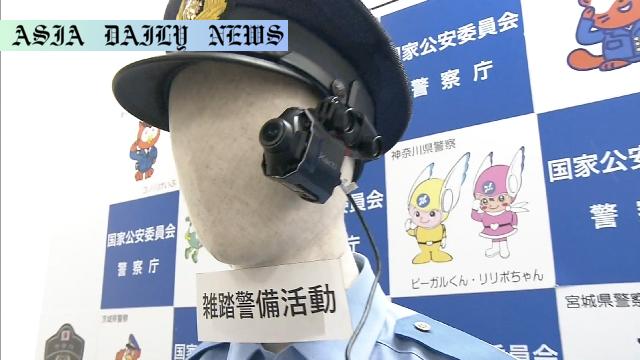Bodycams will soon be tested by Japanese police to prevent disputes and record evidence during questioning or traffic stops.

Japan’s Move Towards Equipping Police with Bodycams
In an era where accountability and transparency are paramount, Japanese police will begin testing the use of body cameras starting August. This initiative aims to address and resolve disputes arising from police interactions with the public, particularly during questioning or traffic stops. In recent years, a rise in incidents involving both public verbal abuse towards officers and complaints against police behavior has been noted in Japan. The adoption of bodycams seeks to act as a safeguard, ensuring accountability on both ends whenever conflict arises.
Officers participating in this trial will wear these cameras on their chest or head, accompanied by a clear indication that recording is in progress through visible armbands. The footage collected will then be stored for a specific period ranging between one week and three months, depending on its relevance, before being discarded. This use of bodycams not only provides a reliable record of events but also deters potential misconduct or abuse through visible surveillance. Such measures align with global trends prioritizing police reforms, reflecting Japan’s commitment to fostering trust within its law enforcement system.
Trial Details and Nationwide Implementation Plan
The trial period is set to range between three months to a year and will cover 13 prefectures across the country. The success and insights drawn from this pilot project will determine its potential implementation nationally, with plans set for possible rollout as early as the fiscal year 2027. The collaboration between the National Police Agency and local departments underscores a methodical approach, emphasizing data-driven assessments before countrywide enforcement.
Globally, bodycams have been hailed as a means to enhance police-public interactions, making them more transparent and less contentious. In Japan, ensuring that such technology is adapted to local cultural and legal contexts will be crucial in achieving the desired outcomes. Policymakers are expected to analyze a range of potential outcomes, from the impact on police-civilian relationships to the logistical challenges involved in maintaining and analyzing recorded footage.
A Step Towards Greater Accountability
The prospect of nationwide adoption highlights the government’s long-term vision of combating miscommunication and enhancing public trust in law enforcement. Equally noteworthy is the potential of such devices to act as deterrents against false accusations or edited footage that misrepresents actual events on social media. By verifying events with unedited, recorded footage, potential ethical dilemmas in disputes can be mitigated, creating a safer and fairer environment for police officers and citizens alike.
It remains important to address concerns surrounding privacy and data management. With footage being retained between one week and three months, watchdog agencies and legal frameworks will play a critical role in determining appropriate usage policies and ensuring that this technology is used ethically. Japan’s adoption of bodycams represents a significant leap towards balancing protection and accountability, achieved through thoughtful integration of innovation into daily policing procedures.
Commentary
The Significance of Bodycams in Modern Policing
The introduction of body cameras for police officers in Japan marks a significant milestone in redefining public safety and accountability practices. By bridging the gap between law enforcement and citizens, these wearable devices represent a proactive approach to addressing concerns on both sides. As incidents of verbal abuse towards officers and allegations of police misconduct grow, bodycams serve as a vital tool in mitigating conflict through transparency.
Japan’s acknowledgment of the social and legal implications of policing sets a strong precedent. The careful implementation of bodycams on a trial basis ensures that cultural and practical nuances are considered before a nationwide rollout. This pilot initiative provides an opportunity to evaluate its effectiveness and address privacy concerns. Moreover, the plan to retain footage for up to three months indicates a balanced approach between data utility and ethical standards in its application.
Balancing Technology and Public Trust
Adopting body cameras highlights not just technological progress but also a significant step towards rebuilding public trust. These devices symbolize a shift in the dynamics of policing—one where accountability is not just expected from citizens but mutually reinforced. This mutual oversight strengthens the foundation of a society built on respect and fairness.
Privacy considerations remain a valid area for debate, requiring robust legal frameworks to prevent misuse. As bodycams document sensitive encounters, their usage must be transparent, with safeguards to prevent breaches. A structured approach to data management and regular audits will be essential to balance the public’s right to privacy with the need for accountability.
Looking Towards the Future
The trial stage of bodycams in Japan represents a microcosm of potential global reforms surrounding policing technologies. Successful implementation could pave the way for other nations to follow suit, using similar methods to resolve disputes at the intersection of public safety and personal freedoms. As these efforts coincide with a broader international focus on police regulation, Japan’s strategy could provide valuable insights into the integration of bodycams within broader systems of law enforcement.
Ultimately, Japan’s commitment to trialing and evaluating bodycams speaks to a progressive vision for public safety. By emphasizing trust-building initiatives that incorporate reliable evidence, the nation’s leadership signals that transparency and accountability are crucial values, creating a safer and more egalitarian society for future generations.


